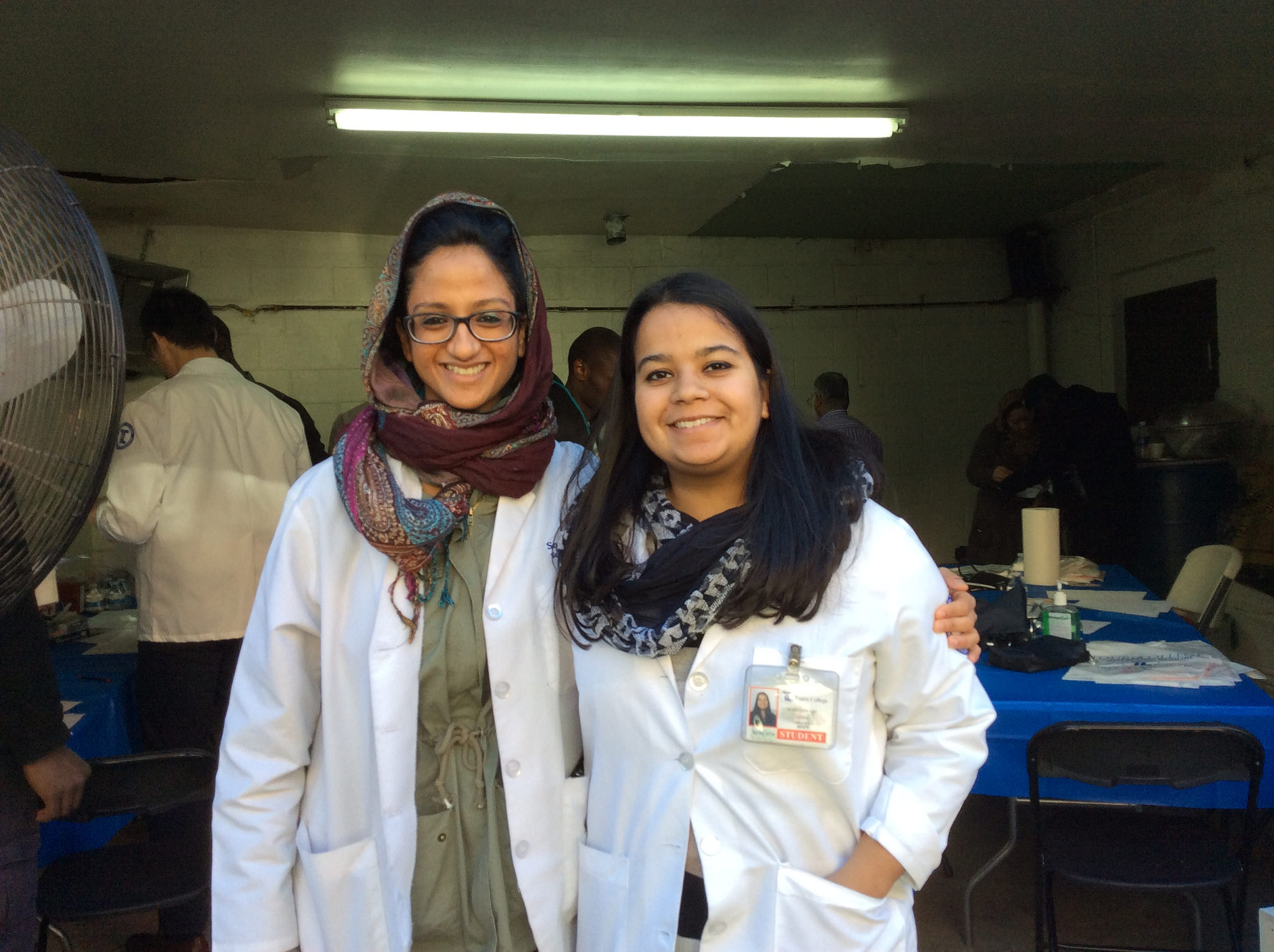Senegalese Health Fair is a Rousing Success
TouroCOM-Harlem students visit their Senegalese neighbors to administer flu shots and health screenings.

It was the usual scene for a Friday afternoon at the corner of 137th and Edgecombe in Harlem, NY: more than one hundred Senegalese residents milled around the sidewalks in front of the Murid Islamic Community in America Mosque. Their afternoon service just completed, the prayer-goers—the men in long robes, the women in colorful head scarves and dresses—were rolling up their prayer mats from the sidewalk. Meanwhile, street vendors hawked their wares (sandwiches, watches, cut-up mango, headsets) in Senegalese.
The only thing unusual about the scene was that instead of heading home, the mosque attendees were now forming lines to receive flu shots.
The event? A health fair for the Senegalese community, organized by Touro College of Osteopathic Medicine (TouroCOM)-Harlem.
The project had been in the works for over a year. The initial idea was conceived by third year medical student Smruti Desai, the 2014-2015 president of the International Medicine S.O./DOCARE TouroCOM Chapter. “We wanted to have a health fair for a community who—due to various reasons—didn’t have the same resources, and didn’t access our school’s biannual Harlem Health Fairs,” she remembers. And when Desai visited the Senegalese mosque, she realized this was a community in need. She approached Dr. John Palmer in September 2014 with the proposal to host a health fair specifically for them, in their “own backyard.” Once the 2015-2016 year began, the reins were passed over to the new president of the International Medicine Club, Tania Maheshwari, who took over the logistical planning. “And now, it’s amazing how everything has come to fruition,” said Maheshwari.
As the student DOs administered flu shots and conducted blood pressure screenings, blood glucose tests, and eye exams outside the brownstone mosque, the excitement and energy on behalf of the participants was palpable. The lines ran out the crowded garage doors onto the sidewalks and around the corner. While they waited their turn, the neighbors chatted with one another. The turnout was so much higher than expected that volunteers had to run back to campus to bring more supplies.
A month before the date of the fair, the student volunteers had undergone a mandatory cultural information session in which Senegalese imams briefed the students on the history of Senegal, its customs and practices, its cultural issues, and dress code. To respect the community they were visiting, female TouroCOM volunteers covered their heads. All went silent when the mid-afternoon prayer began.
“It’s always great when we get the opportunity to go out into our own community to bring healthcare to people in a place they call their own,” said TouroCOM-Harlem volunteer Charles Lopresto, who was administering vision screenings by the dozens. “It was a very meaningful experience.”
In total, 30 flu shots, 75 blood pressure screenings, 43 blood glucose screenings, and 29 eye screenings were administered by over 30 students who volunteered. Faculty volunteers included Dr. Jennifer Zepf and Dr. Tipsuda Bahri. The event was sponsored by a local Senegalese restaurant, Lenox Saphire.
Dr. John Palmer, Director of Community Affairs at Touro, said that this health fair “will save lives” for the Senegalese—whose average life expectancy is about 20 years lower than their European counterparts.
“What we’re seeing now is a lot of guys in their 30s and 20s with high blood pressure,” he began. “They don’t feel it, but it’s gradually taking its toll on them year after year. There may be a genetic component, a stress component, and a dietary component as well, but they don’t see a physician regularly because they say they ‘feel okay’. Meanwhile, their blood pressure is indicating that they’re not okay. So that’s why it’s important to get them exposed to [their health] and show them the importance of health screenings.”
Comorbidity takes its toll on the Senegalese, too, he added. “A high percentage of this population are diabetic already. Add hypertension, and together they produce heart disease. So you’ve got a combination of these illnesses working on these people right now. And if they don’t get into care, they’re going to deteriorate very quickly.”
After the health fair, Dr. Palmer will be working with community leaders—as per their request—to release the findings from the screenings through cable and radio stations. “Doing that will help them understand what their base medical issues are, and to get them the recommendations on what they need to do to improve their lives.”

